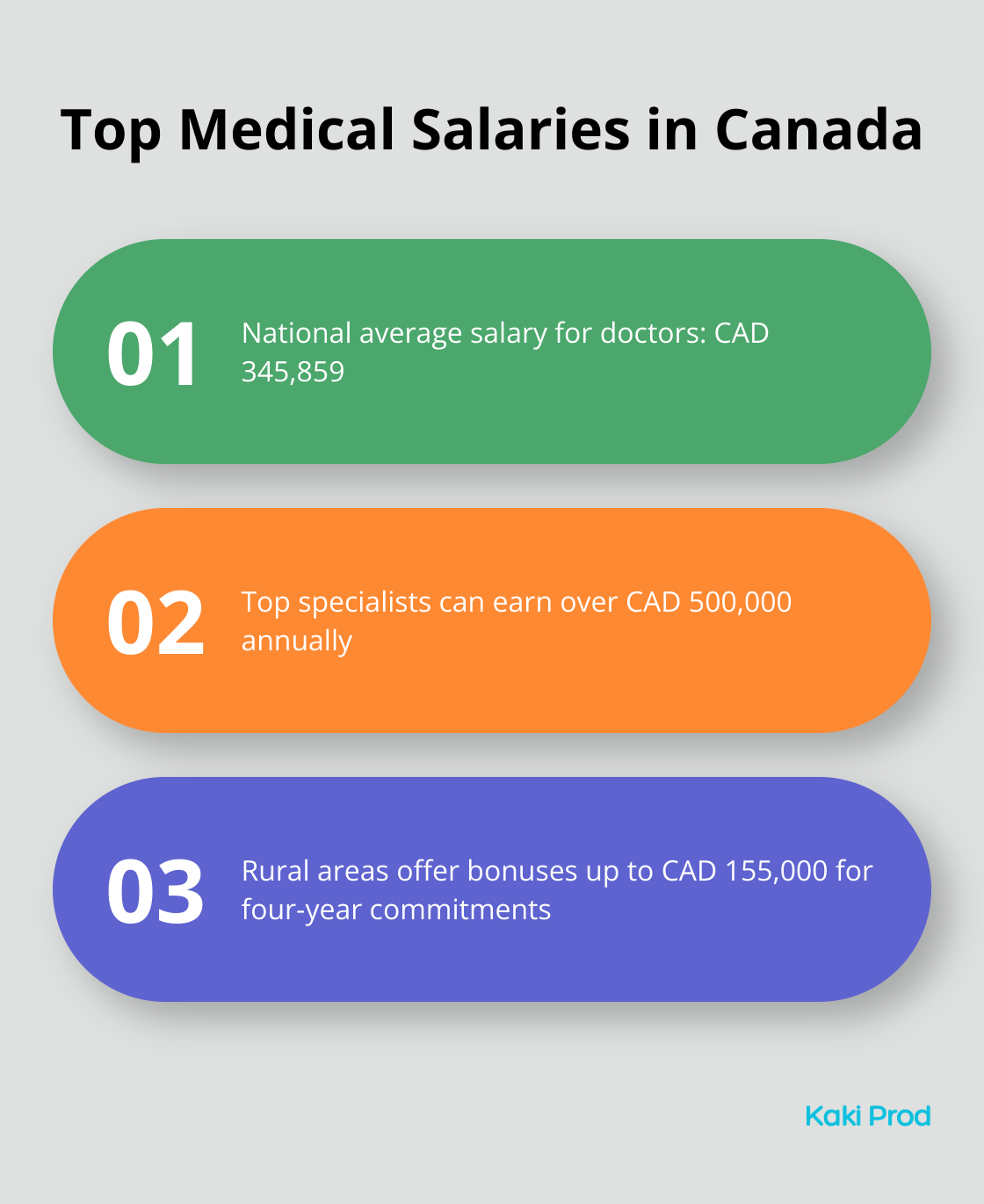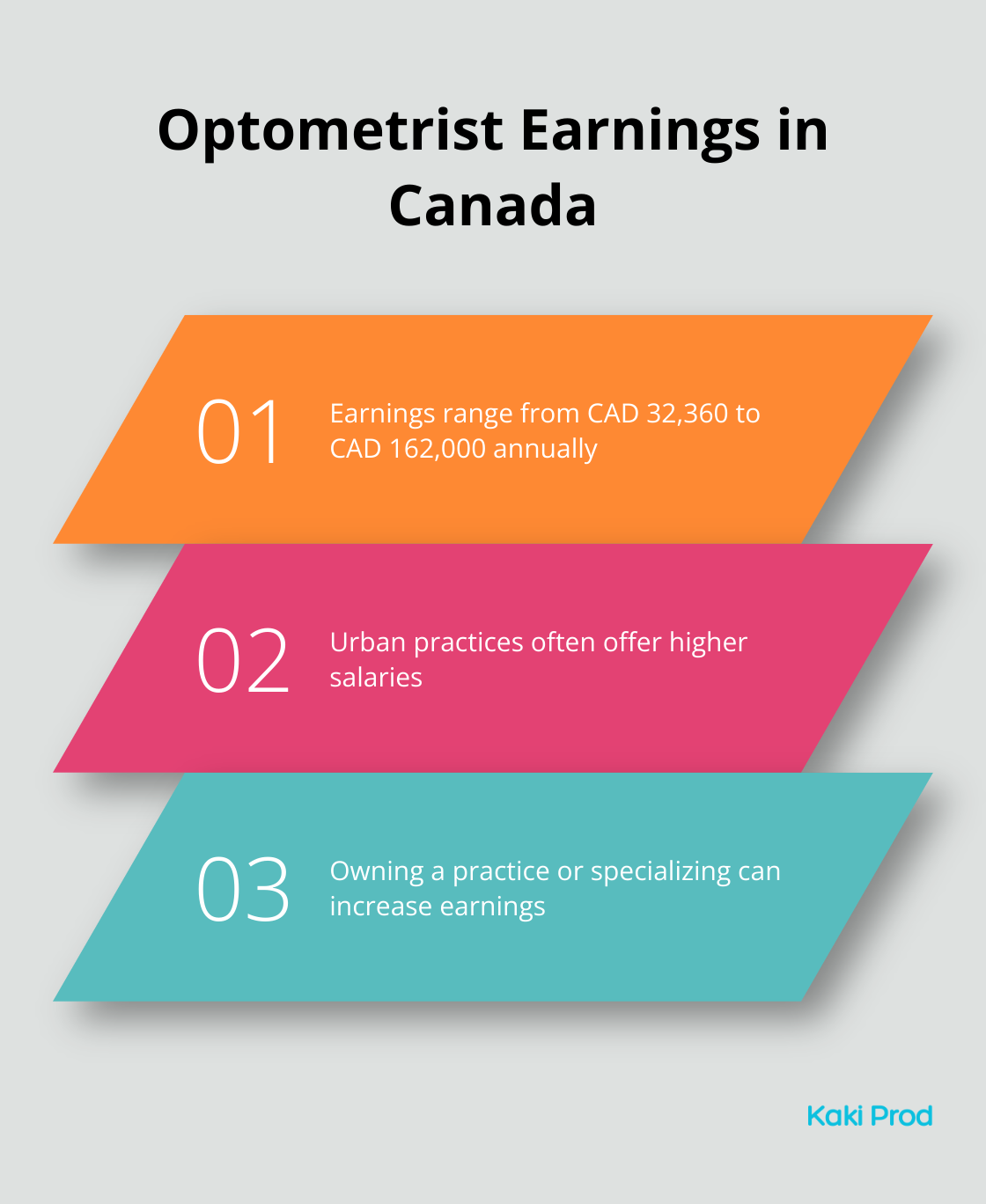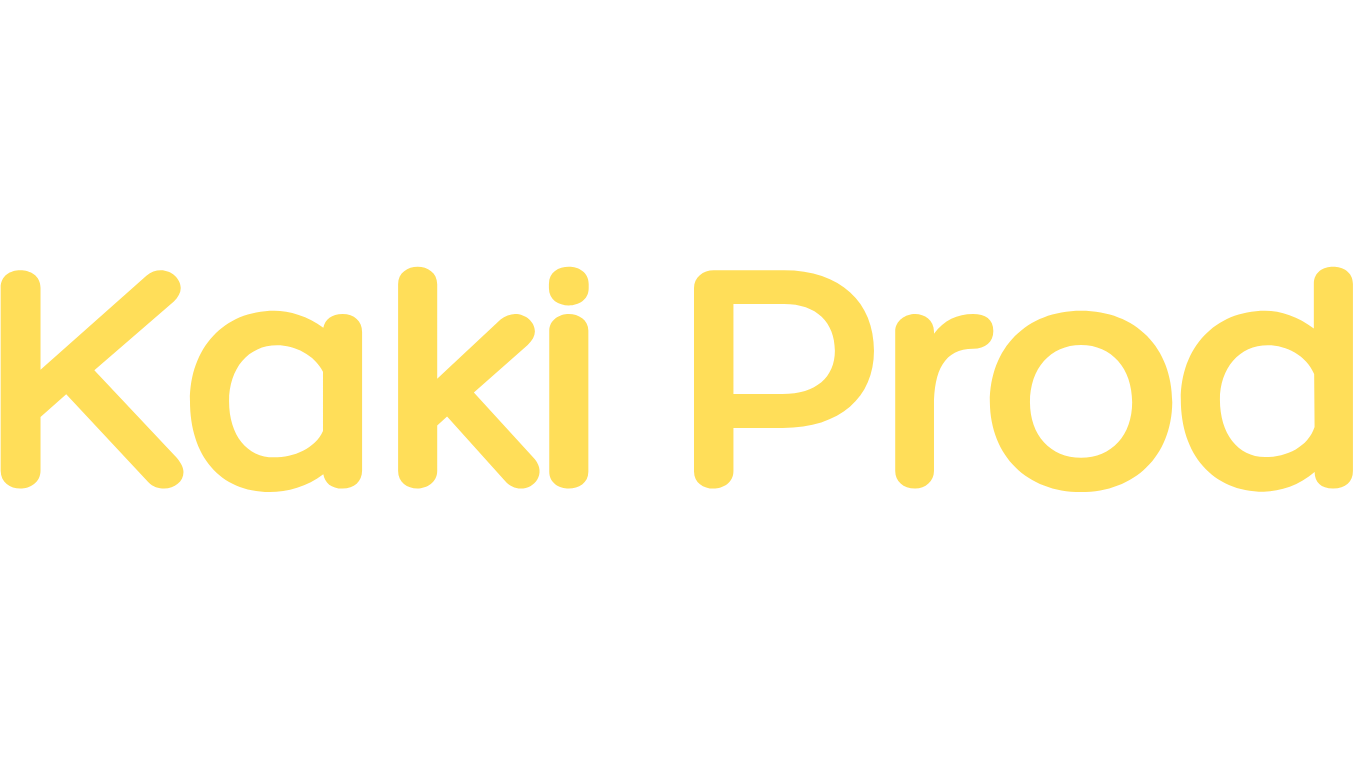Here’s the scoop from Kaki Prod — we’ve crunched the numbers on Canada’s most lucrative degrees. And boy, are they a mixed bag. It’s not just about med school anymore (though, spoiler alert, it’s still up there). We’re talking a buffet of cash-cow career paths spanning a ton of industries. This guide? It’s your treasure map to the top 10 degrees — those that’ll have you laughing all the way to the bank. Buckle up, students and professionals, we’re diving into some serious earning potential.
1. Medicine: The Gold Standard for High Earners
So, medicine. It’s like the penthouse of high-earning gigs in Canada… seriously. Doctors snag some hefty paychecks, with average salaries swinging from CAD 307,870 in Newfoundland and Labrador to CAD 326,871 in Ontario. Nationally? We’re talking CAD 345,859. And for the big league earners:

- Neurosurgeons (yeah, brain docs)
- Cardiologists (heart whisperers)
- Anesthesiologists (the sleep maestros)
These folks can pull in over CAD 500,000 a year. No joke. But getting there isn’t a stroll in the park. Think endless schooling and training marathons. Wanna don that white coat? You gotta hit those specific requirements. That’s Canadian citizenship, passing the Medical Council of Canada exams… the whole nine yards.
But hey – it’s not just about the Benjamins (or in this case, the Loonies). Med grads in Canada? They’re basically employed before they even graduate. Jobs everywhere. Rural areas? They’re practically begging docs to show up, tossing in crazy extras, like CAD 155,000 for a four-year gig. So yeah, the med journey is a beast, but it’s one that lets you really impact lives. As we shift from medicine to law – spoiler alert – lawyers aren’t doing too shabby in the paycheck department either.
2. Law: A Lucrative Path in Canada
So, legal professionals in Canada-how about those salaries? We’re talking impressive numbers. Sure, the digits dance around a bit, but hey, the legal world is a pretty sweet gig for greenhorns and old hands alike. You got your corporate law, your intellectual property, mergers & acquisitions…these are the cash cows. And don’t sleep on tax and securities law, especially if you’ve got a knack for number crunching.
But let’s be real-the road to becoming a lawyer in Canada? It’s not a walk in the park. We’re talking about a three-year law degree, then you’re up against the provincial bar exam, and oh, don’t forget the 10-month articling grind (or you can opt for a Law Practice Program in some spots). Bilingual skills? Yeah, those can fatten your paycheck, especially if you’re eyeballing government jobs or hanging in bilingual zones. And specialization, plus always-learning mode, that’s your ticket to the big bucks in this dog-eat-dog world. Next up, as we hop from the courtroom to the coding lab, let’s dig into engineering degrees and see how they match up in the Canadian job market.
3. Engineering Degrees That Pay Big Bucks
So, engineering degrees in Canada… they’re your golden ticket to high salaries and job security. Software engineers are pulling in an average of CAD 103,607 per year. Yeah, you heard that right. And if you’ve got the chops and specialize, you’re looking at even more cash. Talk aerospace or petroleum engineering-this is where you’ve got the potential to rake in over CAD 150,000 annually. And guess what? With the Canadian government projecting a boom in engineering jobs, the market’s heating up.

Top of the high-paying heap is petroleum engineering. We’re talking average salaries of CAD 181,243. Not too shabby, huh? Then you’ve got software engineers sitting pretty at around CAD 196,472 on average. If you really want to juice your earning potential, specialization and keeping up with new tech trends is where it’s at. Nail that, and you’re looking at rapid pay increases and plenty of job gigs. The engineering landscape is a smorgasbord of cash opportunities (spanning from software savants to niche pros), making it the go-to move for folks chasing big bucks in Canada.
Shifting gears from engineering to business-as we like to do-let’s delve into how an MBA can open doors to career jackpots and other financial adventures.
4. MBA and Finance Degrees Pack a Punch
MBA graduates in Canada earn impressive salaries – think CAD 80k a year or $41.03 an hour. Not bad, right? And if you make it through top schools like Rotman and Ivey, you’re looking at roles as investment bankers bringing in over CAD 150k annually. Financial analysts have pretty sweet deals too, averaging around CAD 64,878 a year in Canada. But strap in for this – get yourself a CFA or CPA certification, and you could bump that salary up by 20% or more.
The Financial Post lets us in on this juicy tidbit: MBAs with a focus on finance or strategy pocket the fattest paychecks, often 15% more than the average Joe. Eyeing that corner office? An MBA is practically your golden ticket. CFOs in Canada’s bustling cities pull in over CAD 368,445 in Toronto. It’s a battleground out there, with firms like TD Bank and RBC vying for MBA grads flaunting AI and data analytics chops (must-have skills in today’s economy). Mix an MBA with these high-tech skills and boom – you’ve got a recipe for crushing it financially in Canada’s business arena.
And as we shift gears from business and finance, let’s dive into another cash-rich gig in Canada: dentistry. This field not only fattens your wallet but also lets you boost people’s health and smiles through top-notch oral care.
5. Dentistry: A Lucrative Path to Oral Health Expertise
Dentists in Canada are cashing in – big time. People working as dentists rake in anywhere from CAD 32,360 to a whopping CAD 228,000 a year. Specialists? They’re often hitting the CAD 300,000 mark. Oral and maxillofacial surgeons are the rock stars here – laughing all the way to the bank with an average of CAD 440,000. Right behind them are orthodontists and periodontists. Why the big bucks? High demand for dental pros with serious know-how.
But let’s not gloss over the grind it takes to get there. Becoming a dentist isn’t for the faint of heart; it’s a dedication marathon if you will. You’re looking at eight years of post-secondary education – at least. What’s on the syllabus?
- A four-year undergraduate degree
- Then it’s off to a four-year Doctor of Dental Surgery (DDS) or Doctor of Dental Medicine (DMD) program
- Time to ace the National Dental Examining Board of Canada (NDEB) exam
- And snag a license in your chosen province
Think about specializing? Add another two to three years of residency to your timeline. Long road, tons of study… but hey, ask those in the field if it’s worth it – high job satisfaction and juicy paychecks say, yes. Now, as we leap from drilling teeth to counting pills, let’s peek into how pharmacy degrees fare in Canada’s gig landscape.
6. Pharmacy Careers Offer Healthy Salaries
Pharmacists in Canada enjoy robust salaries. And boy, do they enjoy them. We’re talking an average salary of $105,799 a year-or $48.42 an hour for keeping it chill. Sure, community and hospital pharmacists might see some variance, but hey, these numbers flaunt the financial allure of this healthcare gig. Got dreams of striking it rich? Pharmaceutical research roles in Ontario dangle an hourly carrot of $44.06-roughly $91,644 annually if you’re clocking in full-time.
And climbing that pharmacy ladder? Let’s just say the path is smooth. Many pharmacists find their way to management with the promise of bigger paychecks. Target a specialty-like oncology or geriatrics-and watch your income potential get a nice boost. If you’ve got that entrepreneurial spirit, owning your pharmacy might just turn into a goldmine. The pharmaceutical industry in Canada isn’t slowing down, with job opportunities popping up over the next 3 years. With this growth, pharmacy promises a comforting cushion of opportunities. Now, as we lean away from pills and towards ones and zeros, how do computer science degrees fare in the land of maple leaves and moose?
7. Computer Science Degrees Rake in Big Bucks
Computer science graduates in Canada – they’re cashing in, big time. Let’s talk numbers: fresh software grads in Toronto are pulling in an average of CAD 85,000… and that’s just for starters. With some experience under their belts, these pros are looking at figures north of CAD 250,000. Diving into data science and AI? Boom – salaries soaring past CAD 100,000 for those seasoned folks.
So, what are the languages of choice? Think:
- Python
- Java
- JavaScript
And it’s not just about coding. Cloud computing, cybersecurity, big data analytics – these skills are like gold dust to employers. Thanks to a dynamite workforce and some savvy government policies, Canada is buzzing with demand for software development. It’s the land of opportunity for tech giants too – Google and Amazon are beefing up their presence north of the border. But let’s pivot. As we glance away from the digital frenzy and delve into risk, how do actuarial science degrees fare in the great Canadian job scene?
8. Actuarial Science Pays Big in Risk Management
Actuaries in Canada…they’re living the dream when it comes to career cash flow. Picture this: entry-level gigs starting at CAD 65,000, and before you know it-bam-you’re pulling in six figures in just five years. If you’re at the top of your actuarial game, with those fancy certifications and years of number-crunching under your belt, then you’re looking at over CAD 150,000 annually. And where, pray tell, are all these big bucks coming from? The insurance industry-of course-paying top dollar for actuarial talent. Not far behind, you’ve got the consulting firms and financial institutions ready to open their wallets. Government gigs, while not as flashy in the pay department, offer that sweet, sweet job security and benefits that make you think twice about the dollar signs.
But, alas, the road to becoming a certified actuary in Canada is paved with…exams. Lots of them. Candidates must navigate a minefield of tests from the Society of Actuaries (SOA) or the Casualty Actuarial Society (CAS). And it’s no quick sprint-more like a 5-10 year marathon while juggling a full-time job. The good news? Each exam you conquer…means more dollars in your paycheck. Employers, bless them, often back you up with study time and will sometimes even foot the bill for those exams. Your career in actuarial science practically rides shotgun with your certification progress, as doors open wider with each new credential. Demand for actuaries is on the rise, especially in emerging arenas like climate risk and cybersecurity (a realm of exciting opportunities for newcomers). But enough with the risk management talk-for now. Next up, let’s pivot to eye care and see how optometry degrees fare in the Canadian job circus.
9. Optometry: A Clear Path to Financial Success
Optometrists in Canada rake in some serious cash, with annual earnings ranging from CAD 32,360 to CAD 162,000. The Canadian Association of Optometrists lays out the usual suspects that affect income: where you work, how long you’ve been at it, and if you’re running your own show. Big cities? Often fatter paychecks. Rural spots? You might find sweeteners to lure eye-care pros. If you’ve got your own practice or dive into niches like pediatric optometry or vision therapy, expect to see more zeros on your checks.

Becoming an optometrist in Canada? Not a walk in the park. Hopeful eye docs gotta tackle:
- A four-year undergraduate degree
- A four-year Doctor of Optometry program
- The Canadian Assessment of Competence in Optometry exam
- Licensure hoops in your province
Oh, and continuing education? Not optional. Keeps you sharp and in the loop with the latest eye-care breakthroughs. Now, turn the page from eye health to animal welfare… let’s see how vet medicine fares in Canada’s job scene (spoiler: there’s money to be made in this heartwarming field too).
10. Veterinary Medicine: A Rewarding Path for Animal Lovers
Veterinarians in Canada-talk about a diverse spectrum-pull in salaries anywhere from CAD 50,000 to a whopping CAD 150,000 a year. The Canadian Veterinary Medical Association is who you wanna check for those stats, as they gather info from provincial vet bods and themselves. Urban clinics? They often shell out more dough, while rural vets get those sweet extras to fix the shortage out there. And hey, owning a private practice? Cha-ching! Big boost to your bank balance.
But hold your horses-becoming a vet isn’t just a walk in the park. It demands a boatload of dedication and schooling. Future veterinarians have got to tackle:
- A four-year trek through an undergrad degree
- Another four years in a Doctor of Veterinary Medicine (DVM) program at one of Canada’s elite five accredited vet schools
- The North American Veterinary Licensing Examination (NAVLE)
- Plus, jump through those provincial licensing hoops
Staying sharp with continuing education-super crucial for career climbing and keeping up with all things vet medicine. And guess what? Job prospects in Canada? They’re looking bright. The BC Labor Market Outlook (2018-2028) suggests the vet employment scene in BC will grow at a nice 1.7% clip over the next five years. So as we mosey from the animal care realm to the grander view of high-paying degree avenues, let’s see how these career paths stack up financially and in terms of job satisfaction.
Final Thoughts
So, picking a high-paying degree in Canada-more than just a cash grab, folks. It’s about passion, skills, stuff you care about. Sure, the degrees we’ve discussed sound like money in the bank. But… they also need heaps of time, effort, and sweat.
Look, job market trends and future prospects-these matter. Some top-dollar gigs? Long hours, stress… and let’s not forget hopping on planes a lot. Might not mesh with your life goals. Dive into what university sites, professional circles, and those government labor reports say. They’re your go-to for schooling needs, job outlooks, and what to expect in salary for Canadian degrees.
And hey, Kaki Prod-they’re your backstage pass to personal growth, career tips, and money smarts in your career journey. Whether you’re hitting the books or eyeing a career shift, they’ve got your back in the ever-shifting Canadian job scene. Because the dream gig? Pays great and vibes with your passions, what you stand for, and those big dreams of yours.

